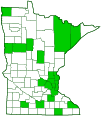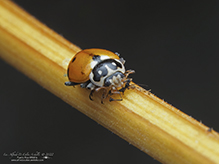variegated lady beetle
(Hippodamia variegata)
Conservation • Description • Habitat • Ecology • Distribution • Taxonomy
|
|
||||||||||||||
Description |
Variegated lady beetle is an exotic, small, black-spotted lady beetle. It is native to Europe, where it is known by the common name Adonis ladybird. It is also native to Asia and North Africa. It was introduced into Australia, where it is now established, and is known by the common name spotted amber lady beetle. Variegated lady beetles were intentionally introduced into North America several times between 1957 and 1983 as a biological control of invasive insect pests. They were imported from India and the Soviet Union. None of these releases became established. In 1984 the first North American specimens of Hippodamia variegata were collected in the area around Montreal, Canada. These specimens were probably introduced from France. Since then, the species has spread widely. It was discovered in Michigan for the first time in 2005. The first recorded sighting in Minnesota was from Minneapolis in 2009. In the United States it now occurs in the east from Maine to northern Virginia, west to North Dakota and Iowa, and on the West Coast from northern Washington to southern California. Adults are active from May through October in fields, meadows, and gardens. They are found mostly on herbaceous plants, less frequently on shrubs and trees. They feed mostly on aphids, but also on scale insects, thrips, whiteflies, and mites. Adults are small, 3⁄16″ (4.4 to 5.0 mm) long and ⅛″ (3.0 to 3.25 mm) wide. The body is elongated oval. The head is black. It is shallowly inserted into the thorax, and it is clearly visible from above. The face is white. The compound eyes are black. The upper thoracic plate (pronotum) is much wider than long. It has a fine raised ridge on the rear margin. It is mostly black but there is a broad white band around the front and side margins; a deep, narrow, white notch in the front; and a small, round, white spot on each side. The white spots sometimes connect to the marginal band in front. The plate between the wing bases (scutellum) is small, triangular, and black. The hardened wing covers (elytra) are orange or reddish orange with a variable number of round black spots. The spots appear in a 3–4–4–2 pattern. The center spot in front surrounds the scutellum and spans both elytra bases. There is a white patch on each side of it. The six spots in the rear and the spot around the scutellum are usually always present. The remainder may be absent or reduced to varying degrees. The third segment (femur) of each leg is black. The remaining segments are orange or yellowish brown. The last part of each leg (tarsus), corresponding to the foot, has four segments, but the third segment is very short, and it is tucked within the extended lobes of the second segment, making the leg appear to have only three segments. The tip of the last tarsal segment on the middle and hind legs has a pair of claws. |
Size |
Total length: 3⁄16″ (4.4 to 5.0 mm) |
Similar Species |
Habitat |
Fields, meadows, and gardens |
Ecology |
Season |
Several generations per year: |
Behavior |
|
Life Cycle |
|
Larva Food |
|
Adult Food |
Aphids, scale insects, thrips, whiteflies, and mites |
Distribution |
||
|
Sources Gardiner, Mary M. and Parsons, Gary L. 2005. "Hippodamia Variegata (Goeze) (Coleoptera: Coccinellidae) Detected in Michigan Soybean Fields," The Great Lakes Entomologist, vol 38 (2). |
|
| 10/4/2024 | ||
Occurrence |
||
Common |
||
Taxonomy |
|
Order |
Coleoptera (Beetles) |
Suborder |
Polyphaga (Water, Rove, Scarab, Long-horned, Leaf, and Snout Beetles) |
Infraorder |
Cucujiformia |
Superfamily |
Coccinelloidea (lady, fungus, scavenger, and bark beetles) |
Family |
|
Subfamily |
Coccinellinae (common lady beetles) |
Tribe |
Coccinellini (black-spotted lady beetles) |
Genus |
Hippodamia (oblong lady beetles) |
Subordinate Taxa |
|
|
|
Synonyms |
|
Adonia variegata Coccinella variegata |
|
Common Names |
|
Adonis ladybird (Europe) Adonis’ ladybird spotted amber lady beetle (Australia) variegated lady beetle variegated ladybug white collared ladybird (Australia) |
|
Glossary
Elytra
The hardened or leathery forewings of beetles used to protect the fragile hindwings, which are used for flying. Singular: elytron.
Femur
On insects and arachnids, the third, largest, most robust segment of the leg, coming immediately before the tibia. On humans, the thigh bone.
Pronotum
The exoskeletal plate on the upper side of the first segment of the thorax of an insect.
Tarsus
On insects, the last two to five subdivisions of the leg, attached to the tibia; the foot. On spiders, the last segment of the leg. Plural: tarsi.
Visitor Photos |
||
Share your photo of this insect. |
||
This button not working for you? |
||
Alfredo Colon |
||
 |
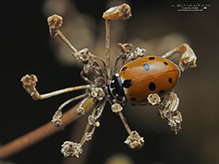 |
|
|
||
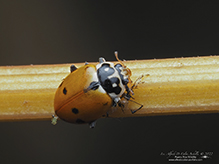 |
||
MinnesotaSeasons.com Photos |
||
|
||
|
||

Slideshows |
Hippodamia variegata |
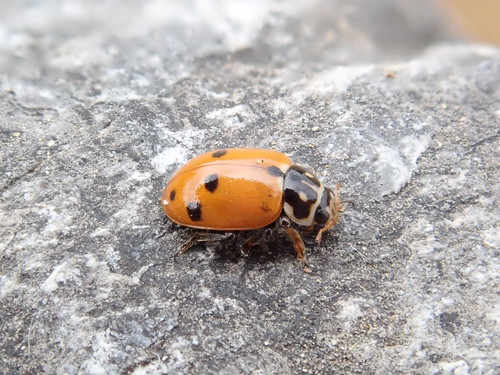
|
About
Hippodamia variegata Adonis Ladybird |
Hippodamia variegata |
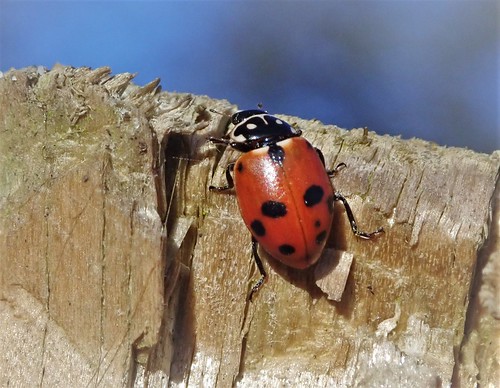
|
Hippodamia variegata |
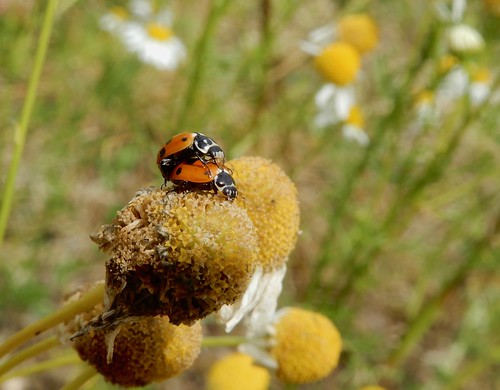
|
About
aka Adonis ladybird |

Visitor Videos |
||
Share your video of this insect. |
||
This button not working for you? |
||
|
Other Videos |
||
Hippodamia variegata, the Adonis ladybird |
About
Jan 1, 2023 |
Adonis Ladybird Hippodamia variegata |
About
Apr 24, 2013 The Adonis (or Adonis') Ladybird Hippodamia variegata appears sporadically in the UK and it is likely that the British population is supplemented by immigration from continental Europe. It is no exaggeration to describe the behaviour of these handsome little beetles as being peripatetic! |
Hippodamia variegata (biedronka) / Adonis ladybird |
About
Jul 12, 2020 Adonis ladybird (variegated ladybug, spotted amber ladybeetle), Variabler Flach-Marienkäfer, Ruigtelieveheersbeestje, Slunéčko pestré, Изменчивая коровка. Owady. Dzikie zwierzęta w Polsce. Dolny Śląsk, okolice Bolesławca. Insects. Wild animals in Poland. Lower Silesia, around Boleslawiec (Bunzlau). |

Created: 12/31/2023 Last Updated: © MinnesotaSeasons.com. All rights reserved. |
